Robot Jox
Welcome back to Misan[trope]y Movie Blog! Next up in the two week spotlight on writer/director Stuart Gordon is 1989’s ridiculously fun giant robot movie, “Robot Jox.”
“Robot Jox” was co-written by the acclaimed Hugo and Nebula winning sci-fi author Joe Haldeman, best known for the 1974 novel “The Forever War.” Reportedly, he is not a fan of the ultimate product of “Robot Jox” that made it to the screen. In 2008, he was quoted as saying:
Some people enjoy [Robot Jox], but to me it’s as if I’d had a child who started out well and then sustained brain damage
This opinion can almost certainly be attributed to frequent clashes between the author and director/co-writer Stuart Gordon over what the direction and tone of the film should be, which caused much of the production to apparently become a nightmare. Gordon wanted an audience-friendly story that could act as a visual, action-packed spectacle, whereas Haldeman was more interested in the story being a serious, harder sci-fi war drama. These visions proved, of course, to be generally incompatible.
Charles Band and his company, Empire Pictures, produced “Robot Jox,” just as they had done for Stuart Gordon’s earlier films “Dolls,” “From Beyond,” and “The Reanimator.” However, “Robot Jox” proved to be a much larger project for the company: the budget reportedly eventually hit $10 million, making it the most expensive undertaking by far for the b-movie outfit.
“Robot Jox” suffered significant delays on its release date due to the (perhaps predictable) bankruptcy of Charles Band’s Empire Pictures, which left it in limbo for a couple of years after the film was finished shooting.
One of the most distinguishing aspects of “Robot Jox” is its inspiring, top-notch score. The music on the film was provided by Frédéric Talgorn, who also worked on the Stuart Gordon film “Fortress,” as well as the animated “Heavy Metal 2000.”
The cinematography on “Robot Jox” was once again provided by frequent Stuart Gordon collaborator Marc Ahlberg, who had a handful of credits to his name in 1989. Included among these is the hilarious sci-fi boxing movie “Arena,” also a product of Charles Band’s Empire Pictures. It is worth checking out for die-hard b-movie fans in need of a deep cut: I have often summed up the film as “Rocky in Space.”
The extensive visual effects and stop motion work in “Robot Jox” was supervised and directed by David Allen, who worked the stop motion on b-movies such as Larry Cohen’s “Q” and “The Stuff,” IMDb Bottom 100 feature “Laserblast,” and Stuart Gordon’s own “Dolls.” Apparently, his work ran into multiple delays due to weather, as he insisted on filming against open sky. Stuart Gordon has stated that the weather issues caused the Mojave desert stop-motion filming to stretch on for “a year and a half…[because] everything that could have gone wrong went wrong.”
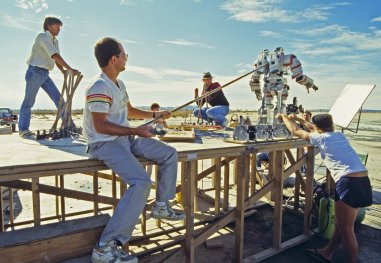
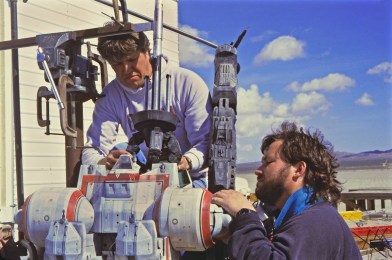 The box office results on “Robot Jox” proved to be nearly as unfortunate and disastrous as the production process. On the rumored $10 million budget, the movie barely grossed $1.2 million in its limited theatrical release. Audiences at the time weren’t particularly thrilled with the movie, though it has certainly gained cult acclaim in the years since its release. It currently hold a 5.2 rating on IMDb and a 41% audience score on Rotten Tomatoes, through you would certainly get a different response from a group of bad movie lovers today.
The box office results on “Robot Jox” proved to be nearly as unfortunate and disastrous as the production process. On the rumored $10 million budget, the movie barely grossed $1.2 million in its limited theatrical release. Audiences at the time weren’t particularly thrilled with the movie, though it has certainly gained cult acclaim in the years since its release. It currently hold a 5.2 rating on IMDb and a 41% audience score on Rotten Tomatoes, through you would certainly get a different response from a group of bad movie lovers today.
The story of “Robot Jox” takes place in a post-apocalyptic world where international conflicts are settled through competitive combat utilizing large, piloted robots. A particular pilot, Alexander, has been causing havoc on the United States, defeating nine pilots in a row as the story begins. The meat of the story follows Achilles, an American pilot who is burned out following a traumatic bout with Alexander that proves fatal to a group of spectator civilians. He is forced to deal with the disdain from his fellow pilots and people for his decision to withdraw from competition, and has to make hard choices that will have global consequences.
The popularity of “Robot Jox” has significantly grown in the years since its flubbed theatrical release. It has recently been featured on the internet review show “Best of the Worst” by RedLetterMedia, it has inspired the Bad Movie Fiends Podcast to name it’s positive review scale “1-5 Jox” in honor of the film, and it even had sound bites remixed into a Nine Inch Nails track by Trent Reznor. Its cult status has even gotten it 35mm theatrical screenings at a couple of the Alamo Drafthouse Theaters in recent years. The release and popularity of Gullermo Del Toro’s “Pacific Rim” has also brought increased attention and viewership to the cult classic in the past few years, drawing many comparisons between the films by bringing giant, piloted robots back to the big screen.
“Robot Jox” does a pretty decent job of building up the desensitized and callous dystopian society that surrounds the plot. I wouldn’t quite call the details subtle, but the hostile and unempathetic behavior of the average person in the world is always noticeably in the background. Personally, I think this makes the peaceful ending all the more impressive and optimistic, but I am sure that many out there would disagree.
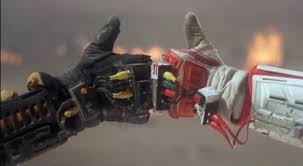 Something that I noticed through reading reviews of “Robot Jox” is that even most of the negative reviews admit that the film is oddly endearing and fun to watch. Most of the complaints strike me as anachronistic gripes about the use of stop motion, or express issues with the overacting in one breath, only to ironically praise it in the next. This is clearly regarded as a classic good-bad film for a reason.
Something that I noticed through reading reviews of “Robot Jox” is that even most of the negative reviews admit that the film is oddly endearing and fun to watch. Most of the complaints strike me as anachronistic gripes about the use of stop motion, or express issues with the overacting in one breath, only to ironically praise it in the next. This is clearly regarded as a classic good-bad film for a reason.
Personally, I think that the stop motion work in “Robot Jox” still looks pretty good for what it is. The method has fallen out of favor in recent years due to the expense involved, and because of the increasing availability of more (ironically) “realistic” computer-generated effects. At the time, however, this was as good as a live action giant robot movie could get effects-wise.
 My personal favorite sequence of “Robot Jox” is probably during the pilot training program, in which about 20 people are forced to climb an electrified jungle gym in a strobe-lighted room. It is at once clever, ridiculous, unnecessary, and perfectly placed in a movie filled with outlandish concepts and designs.
My personal favorite sequence of “Robot Jox” is probably during the pilot training program, in which about 20 people are forced to climb an electrified jungle gym in a strobe-lighted room. It is at once clever, ridiculous, unnecessary, and perfectly placed in a movie filled with outlandish concepts and designs.
As iconic as the last shot of “Robot Jox” is, I feel like the ending probably turned off many typical action movie fans at the time. Conventional logic would have Achilles defeat Alexander, and Alexander pay for his murderous asshattery with a gruesome death. However, the ending winds up showcasing growth on the parts of both men, and they are able to bond over the camaraderie of being driven combatants who struggle to find meaning outside of the fight. The more I think about it, the more I like it. It helps that the acting is hilariously over-the-top and melodramatic, and that it ends on a freeze-frame. You just can’t ask for anything better than that.
Speaking of which, the over-the-top performances in “Robot Jox” define the movie just about as much as the robots themselves. Particularly, Michael Alldredge as “Tex” and Paul Koslo’s Alexander steal the show, chewing every bit of scenery that they can get their hands on. Gary Graham is perfectly melodramatic as Achilles, and clashes with Koslo’s Alexander in just about every way you can imagine. Keen eyes might also spot Stuart Gordon regulars such as Jeffrey Combs and Carolyn Purdy-Gordon filling in background roles.

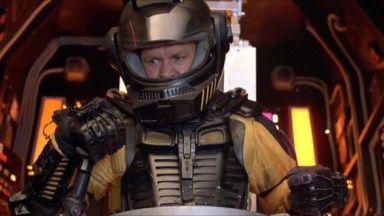
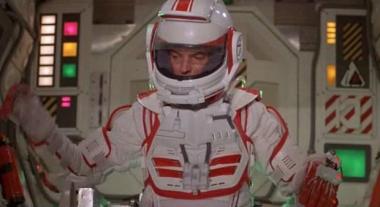 Overall, “Robot Jox” is one of the better good-bad movies out there that hasn’t quite seeped into the public consciousness yet. It isn’t on the level of “Troll 2,” “The Room,” or “Birdemic,” but it may very well be on its way. It is a fantastic showcase of Stuart Gordon’s peculiar style, which is particularly unusual given it is outside of his usual genre of horror. Despite the poor reception at the time, the second wind of this film in the secondary market is more than deserved, and I hope to see a blu-ray release at some point in the future. In any case, many regard this as their favorite Stuart Gordon movie, and I certainly get where they are coming from. It goes without saying that this is a strong recommendation from me: “Robot Jox” will serve for any of your potential bad movie nite needs without any doubt. If you go in knowing what this is, you won’t suffer the disappointment that 1990 theatrical audiences did. Just stop worrying, and love the Jox. Crash and burn.
Overall, “Robot Jox” is one of the better good-bad movies out there that hasn’t quite seeped into the public consciousness yet. It isn’t on the level of “Troll 2,” “The Room,” or “Birdemic,” but it may very well be on its way. It is a fantastic showcase of Stuart Gordon’s peculiar style, which is particularly unusual given it is outside of his usual genre of horror. Despite the poor reception at the time, the second wind of this film in the secondary market is more than deserved, and I hope to see a blu-ray release at some point in the future. In any case, many regard this as their favorite Stuart Gordon movie, and I certainly get where they are coming from. It goes without saying that this is a strong recommendation from me: “Robot Jox” will serve for any of your potential bad movie nite needs without any doubt. If you go in knowing what this is, you won’t suffer the disappointment that 1990 theatrical audiences did. Just stop worrying, and love the Jox. Crash and burn.
![Misan[trope]y](https://misantropey.com/wp-content/uploads/2014/10/misantropeyhead1.png)
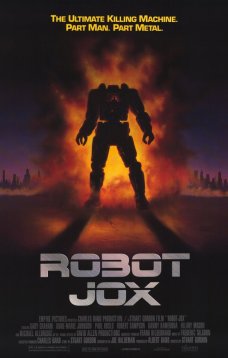
23 thoughts on “Stuart Gordon Spotlight: “Robot Jox””